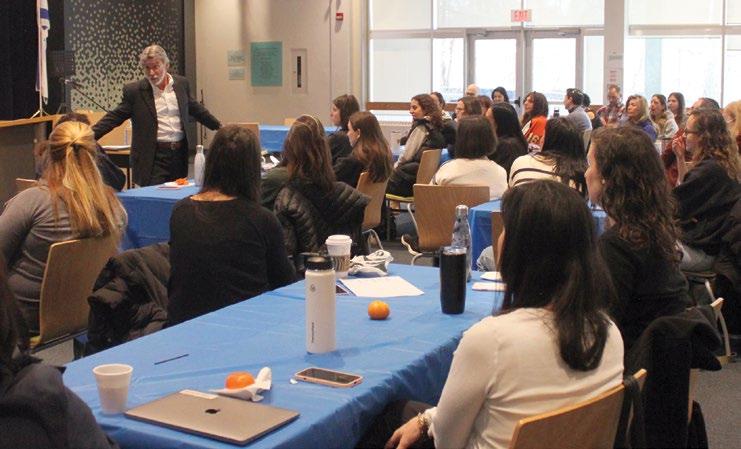
2 minute read
Connection through
BY ADINA LUBEK, PRINCIPAL
With dynamic and innovative leaders in the field, our team had opportunities to examine and ultimately apply differentiation through a variety of lenses.
Advertisement
• Fall PD session – Dr. Laurie Faith spoke to staff about executive functioning skills and overcoming daily barriers to learning.
• Winter PD session – Dr. Todd Cunningham spoke to staff about classroom management and adapting practice for diverse learners.
• Spring PD session – Damian Cooper led staff in learning about differentiated assessment and the need for balanced assessment approaches to reach all learners.
Our professional development on differentiation touched upon several school goals:
1. Our Strategic Plan emphasizes an integrated approach to growth and evolution; the work done to deepen our understanding of differentiation followed this same philosophy. Growth in Differentiated Learning led to growth in many other Strategic Plan areas.
This year’s collective professional development centered on differentiation and a shared desire to provide our students with a program that both honours and addresses the uniqueness of each individual.
With support from a variety of experts, we reflected on our practices and approach in differentiating students’ learning as well as broadening how we define and create opportunities for students to experience differentiation. We worked to shift our thinking from a lesson-by-lesson approach to a holistic consideration of attending to unique needs through all aspects of the classroom environment. This meant examining how students are organized physically in their space, how they work with others, the many different ways in which curriculum could be presented and digested, as well as the social and emotional factors that are involved in each of their experiences. For teachers, this meant further developing skills in planning, presenting and creating learning provocations in the classroom. “How can we connect with as many students in as many ways?” was a question that guided our work.
Through supportive experiences, teachers took on challenges independently, in groups, completed peer observations and honed their skills on giving and receiving feedback focused on finding evidence of differentiation in the classroom. Every member of our teaching team was equally challenged and engaged, enjoying the benefits of a growing confidence in their practices.
2. Expanding our definition of differentiation and broadening opportunities for this concept furthered our work as an IB school. We champion student voice, choice and agency, honouring the ways in which students want to engage with the curriculum.
3. After several years of online learning throughout the pandemic, students and teachers returned to a more hands-on, personal and connected approach to learning.
This kind of work seeks and inspires professional connection. It requires trust, partnership, collaboration and sharing. Through our Kadimah (forward) growth mindset program, teachers meet regularly with their administrative coaches to review their work and stay accountable to their goals. It is through this experience that teachers share the positive impact of a widening lens of differentiation and how it unfolds within their own context. What we have witnessed is a deep appreciation for creating a school environment that truly highlights our mission: to create a nurturing environment. We continue to be committed to creating a school community where students are seen, cared for, supported and challenged on their path of growth.
As the school’s Principal, I feel extremely proud to work in a space where teachers are as dedicated to their own learning as they are to that of their students.






